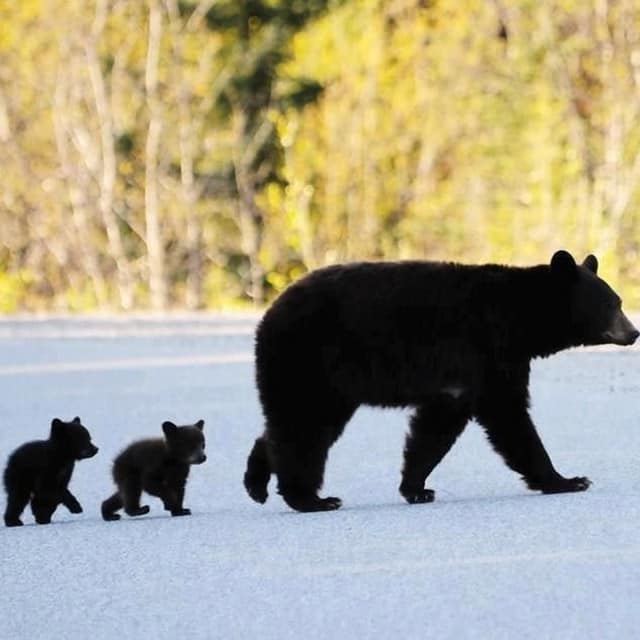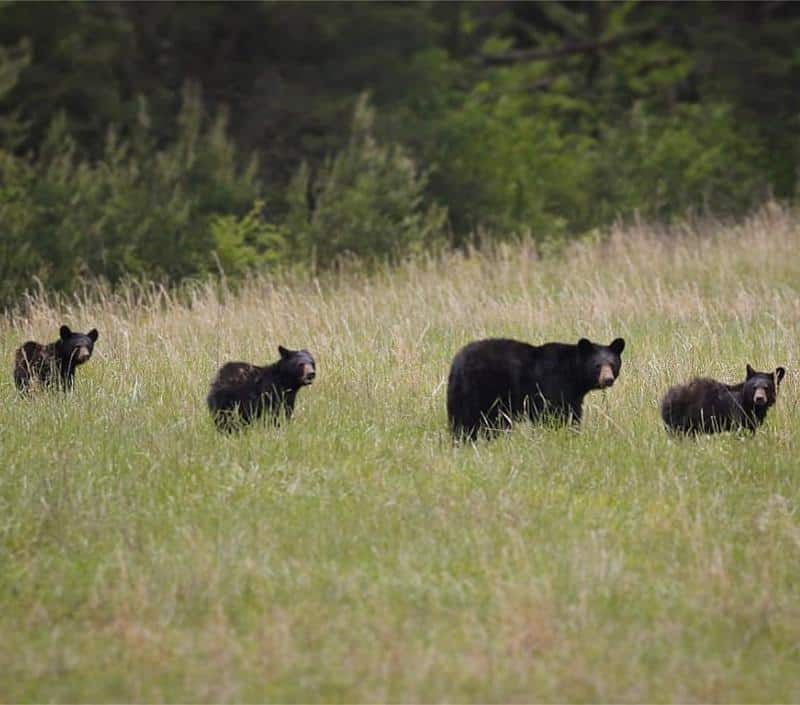Bear attacks in the Smoky Mountains are incredibly rare? If you are heading to this national park, you may wonder how safe you and your family may be. Don’t worry, more people suffer from reactions to bee stings and horse related accidents as they do bear attacks.
As you visit the Smoky Mountains, you may notice bears wandering around and sleeping up trees. Please remember, as cute as they look, they are wild animals and should not be approached as they are incredibly dangerous.

Read on to learn more about bear attacks in the Smoky Mountains and how to stay safe when visiting the national park.
Are Bear Attacks Common in the Smoky Mountains?
Bear attacks in the Smoky Mountains are very rare, and to be killed by a bear even rarer. Generally, the black bears found in the Smoky Mountains eat berries, nuts, and acorns. They will also eat small animals and scavenge on carcasses. Usually bear attacks happen when the animal is desperate food, or they have felt threatened by the presence of humans. They don’t make a habit of eating hikers.
The Smoky Mountains are the most-visited national park in the United States. In general, 2.1 million people visit the national park every year, with many of those people seeing bears. There have only been six known attacks in those years.
The first person who was known to be killed by a black bear within the Great Smoky Mountains National Park was a hiker in 2000. The second happened tragically in 2020. The park tracks bear euthanization and have recorded only 57 since 1990. It is not a decision made likely by park ranger, but once a bear feeds on a human, it is a habit often repeated.
If you’re hiking in the Smoky Mountains, check the Temporary Closures page before planning the trip. They have sections dedicated to bear closures and bear warnings, so please pay attention to the signs to ensure your safety.
What To Do Is A Bear Approaches You?

Although bears generally mind their own business, there are some things you can do to ensure you are safe from attacks when visiting the Smoky Mountains. Bears are quick and have very keen senses, so you don’t want to be approached by a threatened one.
Keep your distance
The Great Smoky Mountains National Park bans visitors from approaching any wildlife within 50 yards or any distance that causes a disturbance. The maximum fine for approaching or feeding wildlife within the park is $5,000 and can earn the perpetrator up to six months in prison. The offense carries such a severe penalty because it puts both the human and the animal at serious risk.
Getting too close to a black bear may cause them to see you as a threat, especially if they do not see an escape route. We recommend not traveling alone or hiking in case you are met with one of these wild bears.
You should never approach a black bear, but you should especially never approach a cub. Females are especially protective of their baby’s, and the chance of an attack increases if a bear thinks her cub is in danger. Generally, cubs stay with their mother for the first two years from birth. If a cub looks like it’s alone, the mother bear is likely going to be nearby.
A bear is unlikely to attack a human unless provoked. If the bear is in a standing position, it’s a sign that they are curious and checking the situation out. Speak calmly and never shout or wave your arms around. Walk sideways to remain non-threatening.
Do not feed them
Feeding bears and leaving your trash behind will encourage the animals to move closer to you, which is both dangerous for both humans and bears. You will also get a significant fine if you get caught feeding the bears, or any of the wildlife. It’s important to pick up your trash as well.
Feeding bears human food can cause them to lose their instinctive fear of humans. Over time, these black bears could start approaching people, looking for food. When hunting for food, their behavior may become more unpredictable and dangerous. Bears who get a taste of human food will start breaking into properties, vehicles, and garbage bins.
Studies have shown that bears who lose their fear of people due to obtaining human food and garbage don’t live as long as bears that feed on natural foods and are afraid of people. An over-friendly bear could be poached or even euthanized.
Leave your pets at home
Dogs and any non-service pets are banned from any park trail in the Smoky Mountains National Park, except the Gatlinburg Trail and the Oconaluftee River Trail. Dogs can be seen as prey for bears, can affect the ecosystem of the park and their barks could make a bear feel threatened.
Carry spray
If you are worried about a bear attack, we recommend carrying bear pepper spray. It should always be used as a last line of defense if you need to protect yourself from bodily harm. According to the NPS, you are allowed to discharge the pepper spray or another relevant deterrent if the bear approaches you within 20 yards.
Other ways to scare the bear away include making loud noises by banging pots or pans. Move to a higher ground is possible, although don’t run or climb a tree (the bear will run or climb much quicker than any human). Spread your arms to make yourself seem bigger. You can also fight back, but this is another last result, using rocks or sticks. Aim for the eyes and snout.
Never play dead, this doesn’t work with black bears. Also, never provoke a bear fight, this should be a last result if they are threatening you or your family. Generally, respect their space and they will respect yours.
Bear Attack Incidents in the Smoky Mountains 2021
In June 2021, a teenage girl was backcountry camping deep in the Smoky Mountain national forest when a bear attacked her as she slept in a hammock at night. It was unusual, as the bear attacked in the middle of the night without any known provocation. The young girl suffered from head injuries and lost a lot of blood. She had to be evacuated by helicopter, but thankfully survived the incident.
In July 2021, a different bear was reported to be causing problems at the Paint Creek Campground in the Cherokee National Forest near Greeneville on the Tennessee-Carolina state line. The bear had been lingering around campers and being threatening towards visitors. Although it never attacked anyone, it was deemed a safety threat and was euthanized.
On Memorial Day weekend in 2021, a visitor caught three adults throwing peanut butter balls to a 100-pound male bear near the roadside in Cades Cove. They were issued a $100 fee for feeding wildlife.
The Citizen-Times also reported in 2021 that some campgrounds were closed due to dangerous bear activity in the Pisgah National Forest near the Appalachian Trail. If a trail, forest, or campsite is marked as closed, please respect the signs and warnings.
Bear Attack Incidents in the Smoky Mountains 2020
WKRN reported that at least 40 bear-human related incidents occurred in 2020. All these incidents resulted in the black bear needing to be trapped, relocated or euthanized. The incidents are almost always related to bears trying to feed from leftover food, garbage or litter.
A man was found dead in the Hazel Creek area of the Great Smoky Mountains in September 2020 was likely to have died due to a bear attack. Patrick Madura’s death is the second bear-related fatality in the park’s history.
The 43-year-old Illinois resident was found dead on the afternoon of Friday, Sept. 11, 2020, after backpackers hiking the Swain County’s Hazel Creek Trail discovered an empty tent at Campsite 82 with a single sleeping bag inside. They then saw a bear dragging a human body across the creek.
Bear Attack Incidents in the Smoky Mountains 2019
A viral video happened in 2019 of a mama black bear charging at a man who repeatedly approached her and her cubs at Cades Cove. The man was approached in this popular tourist spot by a female, who was leading her three cubs across the street.
He put his hand out like he was trying to pet one of the cubs and repeatedly approached the bears. The cub’s mother charged at the man, who quickly jumps back. The man was unhurt, but his behavior was criticized online. You should never approach a bear this way, especially a protective mother bear with her babies.
Read More:
FAQs
How common are black bear attacks in North America?
Research into black bear attacks in the United States and Canada between 1900 and 2009 have found there has been 63 human fatalities related to 50 attacks. Most of these attacks happened between 1960 and 2009, perhaps due to overpopulation and deforestation.
Although it is uncommon to be attacked by a bear in North America, it is not uncommon, so take precautions and act with cautious when visiting the Smoky Mountains.
When do bear attacks commonly happen?
Attacks generally happen in August when black bears ingest high-energy foods in preparation for denning. August is also the month where the most people visit the park and pursue outdoor activities.
In the Smoky Mountains, research has found that the highest number of conflicts between humans and bears happens in May and June, when food is scarce, and the animals are hungry.
Are black bears in the Smoky Mountains aggressive?
In the past decade, black bears in the Smoky mountains are becoming more aggressive and more threatening to humans.
The black bear population has dramatically increased within the Great Smoky Mountains national park, which means that there is less food to go around. There is a connection between the aggressive behavior of bears and the disturbance of food stock.
Final Thoughts
You could encourage a black bear anywhere in the Great Smoky Mountains National Park and its surrounding wildlands. Cades Cove is a common spot to see a bear out in the wild, particularly in the early morning or evening. If you’re staying in the Gatlinburg area, you may even glimpse a bear wandering around town.
Fear not, it is incredibly unlikely that you will be attacked by the bear. As long as you follow some basic rules and respect these wild animals, you will stay safe in this stunning national park.